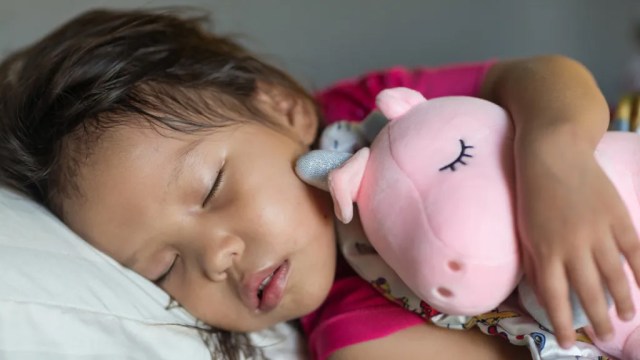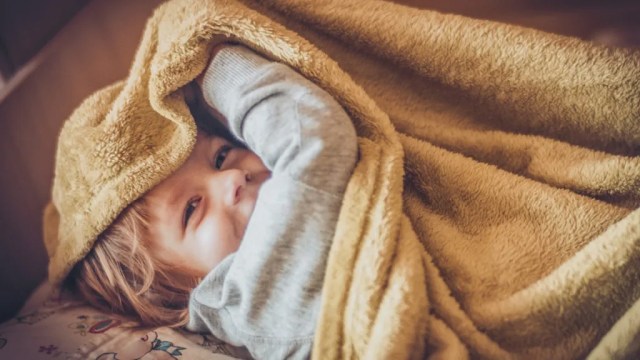There used to be this thing called sleep that we would get at night before any number of tiny humans came into the picture. You probably vaguely remember it. It was nice. But small kids and a good night’s sleep rarely go hand-in-hand, which leaves many parents scrambling to find a solution for their nighttime woes. It’s one thing to have a baby who wakes in the wee hours—we’re repeatedly warned about that—but what about a toddler whose stalling leads to a two-hour bedtime routine, or school-aged kids bolting awake multiple times a night? A lot of parents are taking matters into their own hands, turning to melatonin for some bedtime help. So, does it work? And, more importantly, is melatonin safe for kids?
To learn more about the risks and benefits of melatonin use in children, we spoke to Dr. Sara Siddiqui, a pediatrician at Hassenfeld Children’s Hospital in New York.
What is melatonin and how does it help with sleep?
“Melatonin is a hormone that is naturally found in the body to assist with circadian sleep rhythm and falling asleep,” Siddiqui explains. When you purchase melatonin gummies, pills, or tablets, you’re getting a synthetic version of that hormone that delivers a similar result.
Essentially, melatonin supplements create a signal that bedtime is here—think of it like sending a memo to your brain that says it’s time to get some shut-eye. When you’re dealing with jet lag, for example, it can be really helpful in coaxing your body to fall asleep at a different time than it’s used to. However, Siddiqui points to research indicating that taking melatonin does not help people stay asleep or get better quality rest during the night, which means it won’t stop your four-year-old from bouncing out of bed at 4 a.m. ready to start their day.
Is melatonin bad for kids?
Melatonin can be appropriate for kids when it’s given in the correct dose and only on occasion. “As a pediatrician, I understand the issues with children and sleep,” Siddiqui says. “Some children over the age of 2 may need supplementation of melatonin to assist in falling asleep for a brief period of time.”
While taking melatonin regularly isn’t something that most doctors or sleep experts recommend for children (or adults, for that matter), there’s a time and place for it. “I do recommend melatonin for certain children who are having difficulty falling asleep for various reasons,” Siddiqui says. “Perhaps a stressful event, or a change in environment, a new sibling, or a change in behavior.” It’s also been shown to help kids with ADHD or autism spectrum disorder who have sleep disturbances. Siddiqui stresses that melatonin should be used under the supervision of a pediatrician or another doctor specializing in children’s health, adding that it should be given temporarily and in low doses.

It’s also important to remember that because melatonin is a supplement, not a prescription drug, it’s not regulated by the FDA the same way pediatric ibuprofen, acetaminophen, and other medications are. This means there is no regulatory oversight on the content of melatonin gummies or tablets, and parents can’t be sure that they’re buying a safe, high-quality product. A study published in the Journal of Clinical Sleep Medicine looking at 31 melatonin supplements found that 71% of the products had more than 10% variance from the amount of melatonin they claimed to contain—and a quarter of the products also contained unauthorized (and unlabelled) serotonin!
Basically, it’s a bit of a Wild West where melatonin is concerned, but if it’s used temporarily under the guidance of your pediatrician the risks should be low. The biggest issue is when it’s taken casually or on a regular basis.
How much melatonin is safe for kids?
Siddiqui recommends speaking to your child’s doctor for personalized advice before offering them melatonin. Generally speaking, the typical dosage for kids aged 2-5 would be 1-2mg. A school-aged child may be given slightly more—perhaps 1-3mg—whereas someone over the age of 13 could take anywhere from 1-5mg in a single dose. Most medical professionals will recommend a low dose to start with. Because melatonin supplements differ by brand and all children are different, individualized guidance from a pediatrician is ideal.
Are there melatonin side effects for kids?
Most kids won’t have side effects from taking melatonin supplements, but some will experience headaches, increased bedwetting, nightmares, dizziness, agitation, or grogginess. Luckily, these symptoms typically subside as soon as they stop taking the melatonin supplement. Some researchers have speculated that melatonin can affect puberty-related hormones in children (due to similar findings in studies on animals) but there is no firm evidence and no long-term clinical trials have been conducted to date.
Can children overdose on melatonin?
Unfortunately, melatonin overdoses can and do happen—especially because kids and seniors are more sensitive to these supplements. Fortunately, the risk to their health is fairly low. “While [melatonin] overdoses can lead to excessive sleepiness, headaches, nausea, or agitation, luckily they aren’t dangerous most of the time,” according to Harvard Medical School.
Still, given the lack of regulatory oversight and extensive long-term research, this doesn’t mean that over-the-counter melatonin is completely safe. “Many sleep problems can be better managed with a change in schedules, habits, or behaviors rather than taking melatonin,” the American Academy of Sleep Medicine (AASM) stressed in a health advisory.
If you do choose to give your kids melatonin, be sure to discuss it with your family doctor first and always stick to the recommended dosage for your child’s age and/or weight. Don’t cut melatonin gummies or tablets in half since this can lead to inconsistent dosing.

Other ways to help kids sleep
We understand why exhausted moms and dads are reaching for melatonin, but if it’s late-night Googling that brought you to the supplement you’ve probably also seen the term “sleep hygiene” thrown around—and research indicates that good sleep hygiene is way more effective when it comes to improving your kiddo’s sleep.
“Sleep issues in children are quite common,” Siddiqui says. “The practice of sleep hygiene and good sleep habits is so important to develop from an early age or any time there seems to be a disruption in sleep regulation.”
So what is sleep hygiene? It’s forming the good habits that help your body pick up on those time-for-sleep signals and release its own melatonin, which it does mostly as a result of being in the dark. She recommends:
- a quiet period with no screen time for at least one hour before bedtime
- a sound sleep routine consisting of a bath and bedtime story
- teaching self-soothing techniques to help kids fall asleep and fall back asleep if they wake in the night
- a consistent bedtime and awake time in the morning (yes, even on the weekend—we’re sorry)
Siddiqui also notes that sleep patterns will vary by age, so always start by asking your doctor for guidance if you have concerns about your kid’s health or sleep habits. Good luck and good night!











